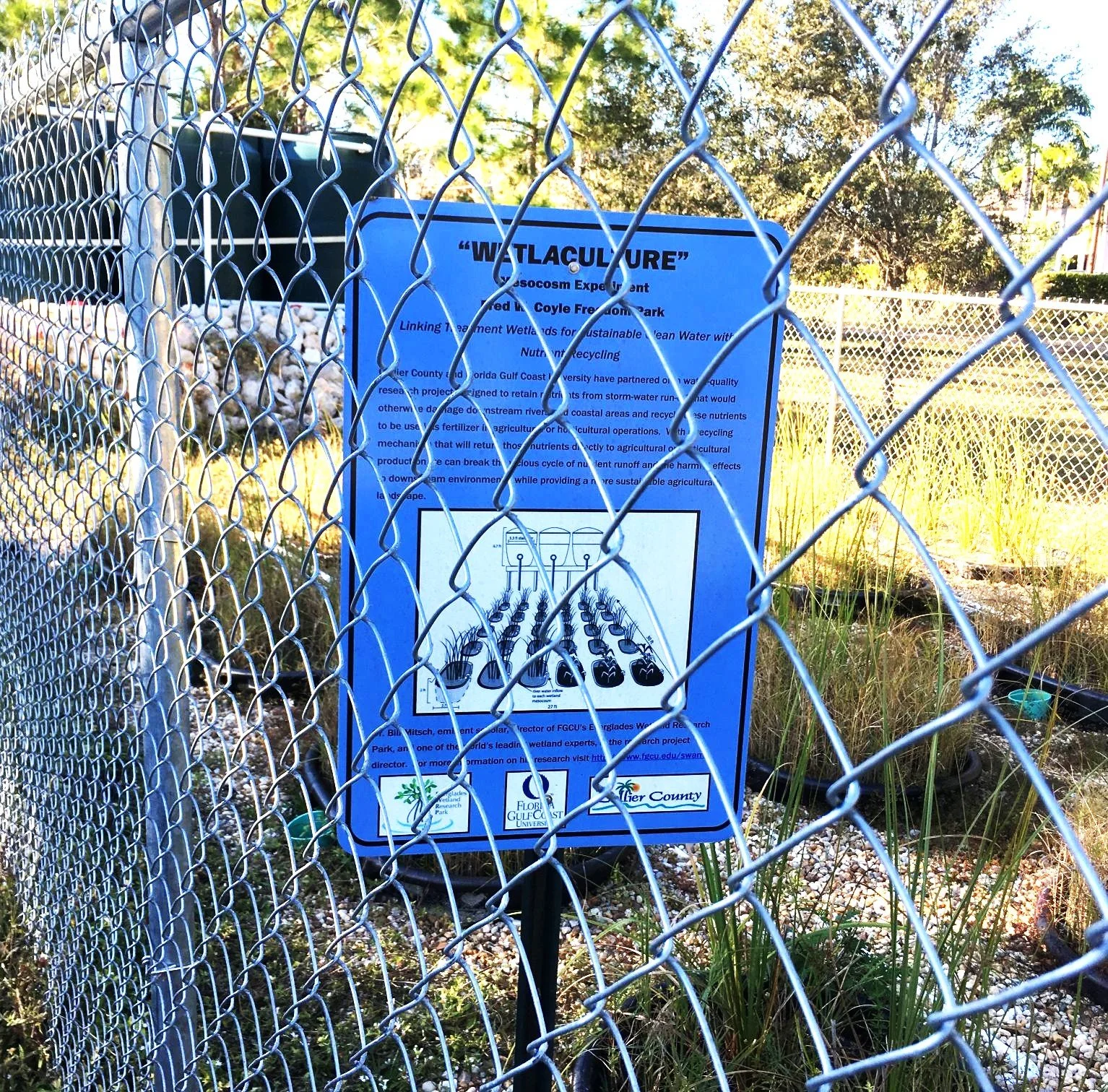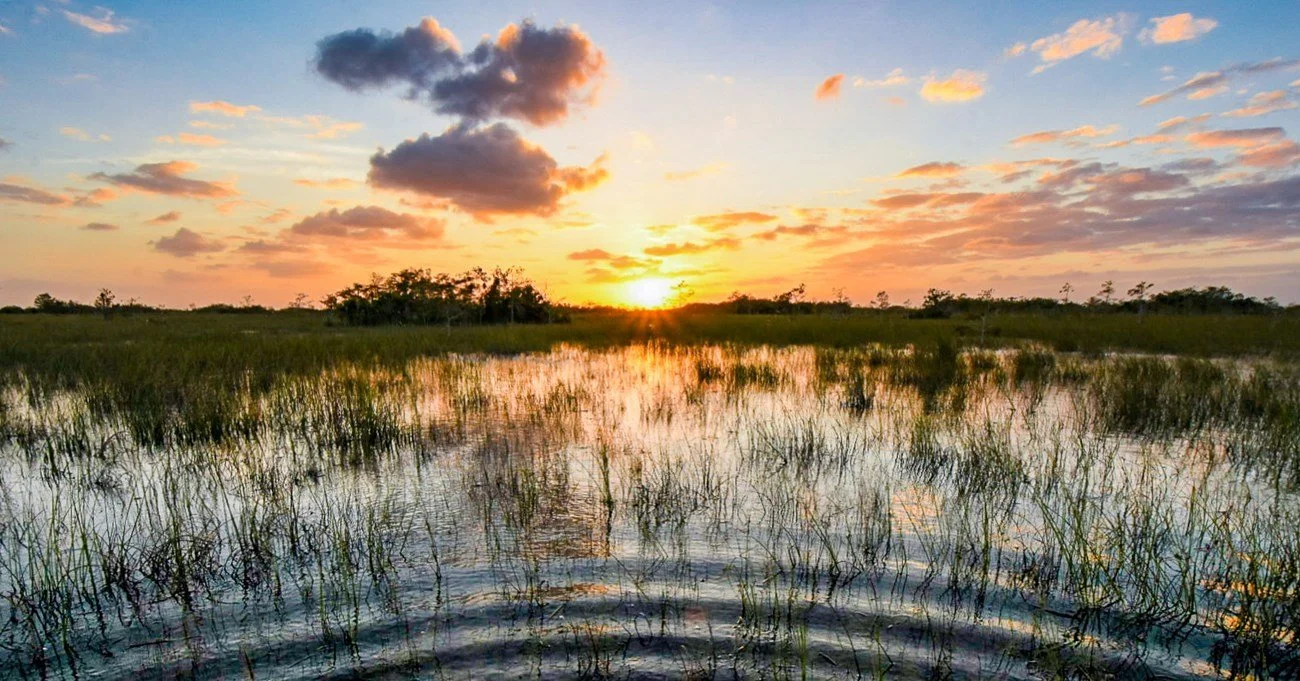Judge Kathleen Williams
Aug. 25, 2025 by David Silverberg
On Thursday, Aug. 21, Judge Kathleen Williams of the US District Court for the Southern District of Florida ruled that the state of Florida’s concentration, detention and deportation camp, Alligator Alcatraz, had to cease operations and be dismantled within 60 days, which falls on Oct. 21.
The State of Florida appealed the ruling within an hour of the decision’s announcement. That appeal is now pending and could go up to the Supreme Court.
However that appeal plays out, it is not too soon to begin thinking about what should happen to the site of what had previously been the Dade-Collier Training and Transition Airport.
This essay recommends that the site be converted into the “William J. Mitsch Memorial Wetlaculture Experiment and Everglades Restoration Project.”
The article will review the court ruling and explain the proposal.
The ruling and reaction
In her ruling, Williams found that the State of Florida, in its haste to set up Alligator Alcatraz, had violated federal laws requiring an assessment of the camp’s environmental impact.
The most relevant law was the National Environmental Policy Act (NEPA), “which requires that major federal actions significantly affecting the human environment undergo environmental review processes.”
While state and federal officials (Defendants) acknowledged possible “deficiencies” in their haste to establish the camp, they argued that any injunction should be vacated while the case made its way through the judicial process (i.e., the camp should be allowed to continue functioning throughout legal deliberations).
Williams was having none of it. Indeed, so blatant was the state’s indifference to due process and the rule of law that Williams’ scorn comes through even in the dry language of a court ruling.
“Here, there weren’t ‘deficiencies’ in the agency’s process,” she wrote. “There was no process.” [Emphasis ours.]
She continued: “The Defendants consulted with no stakeholders or experts and did no evaluation of the environmental risks and alternatives from which the Court may glean the likelihood that the agency would choose the same course if it had done a NEPA-compliant evaluation.”
(The full, 82-page text of William’s ruling can be read here and is also available for viewing and download at the end of this article.)
The ruling also dealt with issues of venue, finding that the Southern District of Florida was the proper court to consider the case; the degree of permanent environmental harm the camp was causing; and responsibility for the camp’s establishment and operations (the State of Florida rather than the federal government).
Because of its violations of law and environmental impact, Williams issued an injunction that prohibited the defendants from installing any new lighting “or doing any paving, filling, excavating, or fencing; or doing any other site expansion, including placing or erecting any additional buildings, tents, dormitories, or other residential or administrative facilities,” although modification of existing buildings is permitted for the sake of safety or environmental mitigation.
New detainees cannot be brought to the camp.
The order applies to everyone involved in camp operations, whether state or federal.
According to the order, “No later than sixty (60) days,” which falls on October 21, state and federal officials have to remove the fencing, lighting and “all generators, gas, sewage, and other waste and waste receptacles that were installed to support this project”—essentially, returning the site to its prior state and giving Miccosukee Tribe members complete access to the area.
Lastly, the plaintiffs were required to post a token, $100 bond.
Not only was an appeal of the order immediately filed in the 11th US Circuit Court of Appeals in Atlanta, Ga., but it was predictably denounced by Gov. Ron DeSantis (R).
“This is a judge that was not going to give us a fair shake,” DeSantis said the day after the ruling during remarks in Panama City. “This was preordained, very much an activist judge that is trying to do policy from the bench.”
He continued: “This is not going to deter us. We’re going to continue working on the deportations, advancing that mission,” referring to President Donald Trump’s roundups and deportations.
The state is proceeding with plans for a “Deportation Depot” camp west of Jacksonville, Fla.
“We’re not going to be deterred; we’re totally in the right on this,” DeSantis said. “But I would also note, because of the success of Alligator Alcatraz, there’s demand for more.”
While appealing the ruling, Florida officials may simply ignore the judge’s order. There is precedent for this.
In that case, Williams was the judge whose order was defied by Florida Attorney General James Uthmeier. In April she issued an injunction against enforcing a Florida law making it a misdemeanor for undocumented migrants to enter the state. Uthmeier sent a letter to police chiefs and sheriffs saying that the injunction was legally wrong and he could not force them to obey it. In June, Williams found Uthmeier in contempt but his only punishment was to produce biweekly reports on enforcement actions.
“Litigants cannot change the plain meaning of words as it suits them, especially when conveying a court’s clear and unambiguous order,” Williams wrote at the time. “Fidelity to the rule of law can have no other meaning.”
It remains to be seen if those words will have any impact on the dismantlement of Alligator Alcatraz.
A modest proposal: Restoration and renewal
Bill Mitsch in his natural habitat, 2021. (Photo: Bill Mitsch)
William Jerome Mitsch was one of the world’s foremost scientific experts on wetlands like the Everglades and did much of his work at Florida Gulf Coast University. In 2022 he retired after a 47-year career and passed away in February of this year at the age of 77.
(To see a full profile of Mitsch and his work see: “On a personal note: An appreciation of Bill Mitsch, a wetlands warrior.”)
In 2018, Mitsch proposed a solution to the problem of pollution affecting the Everglades.
He called it “wetlaculture.”
The concept was that pollution could be defeated by creating new wetlands and this could be done by planting sawgrass, which is native and thrives in this area. The sawgrass would filter out contaminants while letting water flow. These new wetlands could be created on previously cultivated land. He believed that the grass would create soil so fertile that nitrate fertilizers would be unnecessary.
He calculated that new wetlands could be created over a 10-year time period. At the end of that time, the soil would be flipped and used for farming for 10 years. Then, it could be flipped again to lie fallow for another 10 years and so on, indefinitely.
A small-scale Wetlaculture experiment is already under way in Freedom Park in Naples, Fla. There, 28 bins hold sawgrass and researchers experiment with different levels of water and nutrients in the different bins as the sawgrass grows. Scientists measure nutrients in the soil and see if nitrates and phosphorous are being removed. When the soil is deemed to be clean and fertile enough they’ll plant crops and see how well they grow.
A sign marks the spot of the current Wetlaculture experiment in Freedom Park in Naples, Fla. (Photo: Author)
If Alligator Alcatraz is in fact closed and dismantled the “William J. Mitsch Memorial Wetlaculture Experiment and Everglades Restoration Project,” would be a most fitting replacement.
The concrete, asphalt and especially the runway could be scraped and removed and in its place be planted with sawgrass with an eye to flipping it after 10 years, or whenever scientists deem it appropriate. The plantings would likely restore water flow, cleanse pollution and prepare the soil for crops in their turn.
Instead of destroying the natural environment, the “William J. Mitsch Memorial Wetlaculture Experiment and Everglades Restoration Project” would restore it. Instead of the constant floodlights, the area would be restored to the darkness that made it part of Big Cypress’ International Dark Sky Park. Instead of noise and traffic, there would be quiet and calm. Instead of harming wildlife, animals could thrive. Instead of fencing out the public and the Miccosukee Indian Tribe, all would have access.
As for the expense, it would be far less than the $450 million expected to cost Florida taxpayers to run Alligator Alcatraz this year alone. It would also cost Florida and the nation far, far less to maintain in every subsequent year. Moreover, because it would be a scientific experiment, it would be eligible for academic and research funding.
Most of all, it would replace a concentration camp that is likely to be a blot and a stain on Florida’s history and on the history of the United States. Rather than a disgrace, Florida and the Everglades would have a site that improves the future, addresses environmental challenges and would be in harmony with the land, water, plants, animals, people and climate. Instead of punishment, the Mitsch Memorial Experiment would be a place of possibilities.
“When you come to a fork in the road, take it,” Yogi Berra, the Yankee baseball catcher famous for his malapropisms, supposedly said. Along the old Tamiami Trail, right on the Collier County-Dade County line, Florida and the American people have come to a fork in the road. One path leads to a concentration camp of deliberate human suffering, oppression and brutality. The other path leads to a restoration of nature’s balance, a hopeful future and great potential benefits.
The time has come to take the fork in the road. A “William J. Mitsch Memorial Wetlaculture Experiment and Everglades Restoration Project” is clearly the better path to follow.
The Everglades. (Photo: National Park Service/Robert Krayer)
To read all of The Paradise Progressive’s coverage of Bill Mitsch, click here.
Click the button below to read and download the full 82-page text of Judge Kathleen Williams’ decision.
Liberty lives in light
© 2025 by David Silverberg



